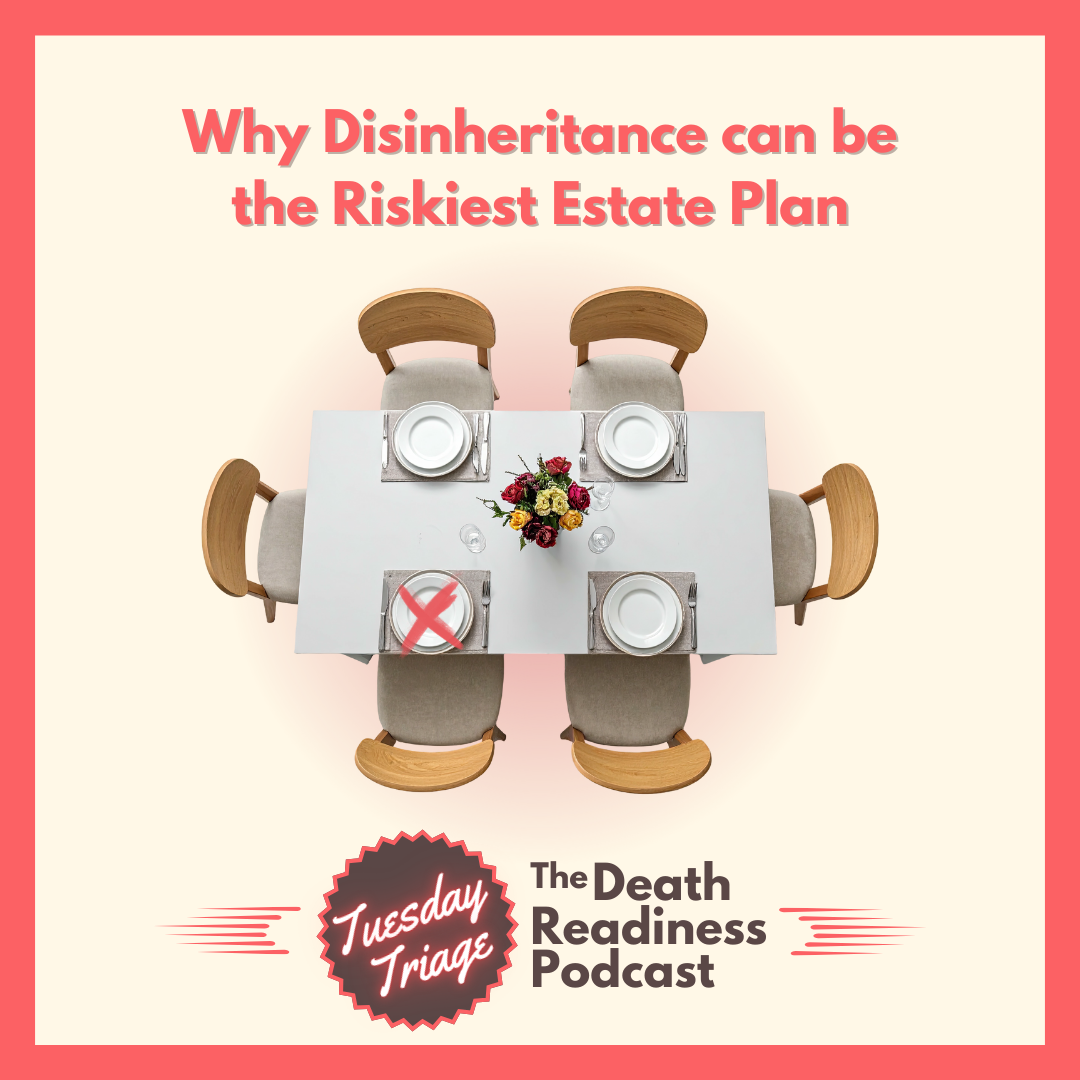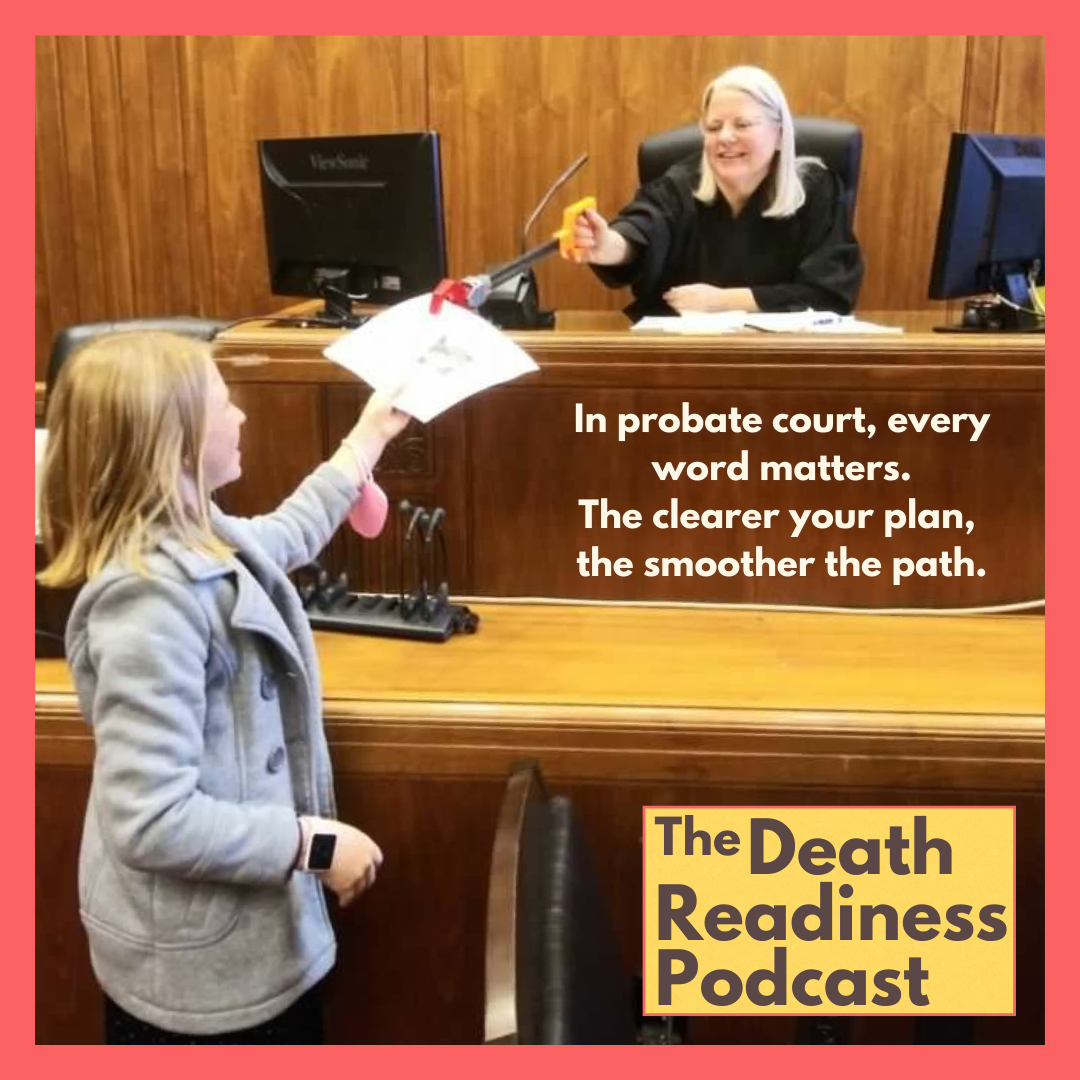Not Your Average Death Blog

Why Disinheritance Can Be the Riskiest Estate Plan
As much as we’re sold the idea of “holiday magic,” the reality is that holidays are often where long-standing family tensions come into sharp focus. Especially once you’re the one hosting, coordinating, cooking, cleaning, and trying to keep everyone emotionally regulated. When you’re tired and stretched thin, it’s not uncommon for an unsettling thought to creep in: There’s someone in this family I might need to disinherit.
Disinheritance is usually framed as a decisive solution, a way to protect assets, stop enabling bad behavior, and finally draw a boundary. But in practice, disinheritance is often one of the riskiest estate-planning decisions people make—legally and relationally.

Why Housing Security Gets Overlooked in Blended Families
Many families look stable from the outside—until one illness, one death, or one move changes everything. I see this especially in blended families and long-term relationships where people share a life but not legal ownership of the home they live in.
Today’s Tuesday Triage episode is about this quietly risky situation when someone lives in a home they don’t own. Things go sideways not because anyone has bad intentions, but because the legal protections people assume are there often aren’t.
Today’s question is from a listener named Sarah. Sarah’s dad lives in a condo owned by his long-term partner. They’re committed and they’ve made a life together. But legally, Sarah’s dad has no guaranteed right to stay in that home. If her dad’s partner became ill and needed to move out, or if she died, her father could suddenly find himself without housing. This situation is common in blended families, second relationships, and couples who choose not to marry.

How to Write Your Own Will (and Why It’s Not as Simple as You Think)
I spend a lot of time thinking about how people avoid estate planning, not because they don’t care, but because they genuinely don’t know where to start. And nothing captures that better than a question I got recently while checking out at Trader Joe’s in Michigan.
A cashier named Ron noticed my Death Readiness sweatshirt and asked the question almost everyone has wondered at some point: “If I want to leave everything to my brother, can I just write it down and sign it?”
The short legal answer, at least in Michigan, is yes. A handwritten Will (called a holographic Will) is valid if it’s dated, signed, and the material portions are in your handwriting. But when it comes to planning for real-life families, real-life assets, and real-life drama, the better answer is: this gets messy fast.

How to Keep Your Ex Out of Your Estate Plan
When you go through a major life change, you think the moment of “finalizing” something will bring a sense of closure. But usually, it doesn’t. When my husband and I bought our house this fall, I was convinced I’d feel relieved the minute we signed the paperwork. Instead, we immediately plunged into the real work—packing, moving, cleaning out the old place, dealing with inspection repairs, and pretending we’d get around to changing the keypad code “tomorrow.” Weeks later, most of that list is still waiting for us. That weird gap between being “done” on paper and nowhere near done in reality is exactly where one of my listeners, Amy from Nashville, finds herself right now.
Amy is newly divorced after ten years of marriage. The court has signed off. The marital dissolution agreement is official. She is, in theory, “legally done.” But like so many people who reach this point, she quickly realized there’s a long list of loose ends that don’t magically handle themselves. One of the questions at the top of her list was: does she need to update her Will to remove her ex-spouse?

How to Give Money Without Triggering Gift Tax
As we head into the season of giving, there’s always a moment where generosity bumps up against a familiar question: “Is this going to trigger gift tax?” Most people have heard of the gift tax, but very few understand how it actually works. And nearly everyone assumes it applies far more often than it really does. Before you write a check, Venmo your niece, or help with a tuition bill, it’s worth understanding what the IRS considers a “gift,” which gifts are entirely tax-free, and when you need to file a gift tax return.
This topic landed in my inbox through a listener question from Bethany, an immigration attorney in Washington state. Like many lawyers, she’s become the unofficial “legal help desk” for friends and family. One of those friends, whom we’ll call Becky, wants to write a check to each of her nieces and nephews this year and isn’t sure whether she’ll owe gift tax. It’s a common worry, especially around the holidays, and it’s one that can be cleared up pretty quickly once you know the basics.

Can You Inherit from Someone You Tried to Kill? The Michigan Case that Surprised Everyone
If you spend enough time in trusts and estates, you eventually learn that the law and common sense don’t always travel together. A recent Michigan case illustrates this perfectly, raising a question most people never imagine needing to answer: Can someone inherit from a person they were once accused of trying to kill? It’s an uncomfortable question, and the answer is not what most people expect.
This case centers around a trust created by a man named Donald shortly before his death in 2017. His wife, Elaine, became the sole beneficiary after he died, and their son, Donnie, was next in line. The trustee at the time, Michael, was not a family member but had been named in the trust documents as a future beneficiary after Donnie’s death. Within months, however, the probate court removed Michael as trustee, a notable action that suggested the court had concerns about how the trust was being managed.

The Hidden Tax Traps in Lifetime Gifts
Avoiding the Hidden Tax Trap in Lifetime Gifts
We love the idea of “getting things done.” We declutter, we consolidate, we “get the house out of Mom’s name.” But sometimes, our efforts to simplify make things more complicated, and more expensive, than we ever intended.

Why Losing Your Original Will Could Cost Your Family Everything
You’d think “filing” your Will would be simple. But as one listener, Jazmine from New Jersey, found out the hard way, it’s not that simple. She thought she had “filed” her Will with her attorney. When her house was burglarized and her important papers were stolen, she wasn’t worried about her Will. She assumed her attorney still had the original. Except, he didn’t. He’d been disbarred and his law firm no longer existed. And her original Will was gone. So, what does it even mean to “file” a Will? And what happens if yours goes missing?

Can You Leave Money to Your Dog?
Your dog might run your home, your heart, and your schedule, but legally, he’s still property.
You can’t leave money to your dog, because under the law, your dog is considered property. And property can’t inherit property.
But you can make sure your pet is cared for if you’re not around to do it. That’s where pet trusts come in.

We Don’t Plan Because We’re Old. We Plan Because We Care.
Every week on The Death Readiness Podcast, I hear from listeners who are deep in the trenches, raising kids, helping parents, juggling jobs, and trying to hold all the loose threads of family life together.
Sometimes, they write in with questions for #TuesdayTriage episodes, such as:
“How do I start talking to my parents about their Will?”
“What happens if I’m named as executor and don’t want the job?”
“How can I protect my kids if something happens to me?”
And sometimes, their messages are more personal.

Do You Really Need a Will? Here’s How to Tell.
Most people assume a Will is the first step in estate planning.
But a Will doesn’t control everything you own; and in some cases, you might decide you don’t even need one.
When I practiced as an estate attorney, one of the questions I got more than any other was,
“Do I need a Will?”
And my answer was always the same:
“I don’t know — not yet.”
Because before you can decide whether you need a Will, you have to understand what a Will actually does.

Why You Don’t Have to Take the Executor Job
When people find out they’ve been named Executor in a family member’s Will, the reaction is almost always the same: panic.
Not because they don’t care, but because they know the person who chose them never really got their affairs in order. The paperwork’s scattered, the passwords are missing, the beneficiary designations are outdated, and there’s no clear roadmap for what comes next.
But here’s the truth: you don’t have to take the job.

Death Readiness Is a Family Affair
I talk about death and estate planning a lot. It’s part of my work, my mission, and my daily conversations.
But nothing brings it home quite like seeing my daughter, April, wearing our latest Death Readiness merch. This is why I do what I do.

When Transfer-on-Death Deeds Promise to Avoid Probate but Create Chaos
We love shortcuts. Grocery store self-checkout. The “express” car wash. Even skipping steps in estate planning, like using a Ladybird deed (also called a transfer-on-death deed) to keep your house out of probate.
On the surface, a Ladybird deed looks amazing. Sign a deed, name who gets the house, and no court gets involved. Cheap, simple, done. Except, like most things in estate planning, what sounds easy can turn into a mess for the people you leave behind.
Today, I sit down with Minnesota probate attorney Jen Gumbel to dig into the good, the bad, and the ugly of transfer-on-death deeds. She’s seen firsthand how they play out in real life, and the results aren’t always pretty.

Do You Need to Update Your Will When You Have More Kids?
Leslie signed her Will five years ago when she had one child. Then she had twins. Now she’s got three kids, and she’s wondering: does her Will still work, or does she need to change it?
It’s a question I get all the time. And the answer is… it depends.
Good estate planning attorneys use solid forms that account for future kids. For example, my own Will doesn’t just name my children; it includes any child “born or adopted after the date of this Will.” That way, if my family grows, the Will automatically grows with it.

How Small Gaps in Your Will Become Big Problems
Twelve years after my mom died, her jewelry still lives in my dad’s house. My sister and I each picked out the pieces we wanted, and I even used one of her rings as my engagement ring.
The rest was tucked away in her dresser drawer until my daughter, April, started exploring them this summer. April never met my mom, but when she wore her grandmother’s earrings to homecoming last weekend, it was like she’d found a way to connect with her.
Jewelry can be a bridge between generations. But in estate planning, it can also be the opposite: the spark that lights a family feud.

6 Steps to Finding the Right Estate Planning Attorney for Your Situation
Finding the right estate planning attorney can feel overwhelming and choosing the wrong one can cost you time, money, and peace of mind. In today’s Tuesday Triage, Jill walks you through six practical steps to help you identify the right fit for your needs, avoid common pitfalls, and trust your instincts throughout the process. Whether your estate is simple or more complex, these tips will give you clarity and confidence in choosing the attorney who can best serve you and your family. Here’s a summary of the tips Jill offered on today’s podcast.

From Problem-Aware to Solution-Aware: Why Families Get Stuck in Estate Planning
Most of us know we should have an estate plan.
But knowing there’s a problem doesn’t always mean knowing how to solve it.
That difference is the gap between being problem-aware and solution-aware, and it explains so much about why families put off planning, even when the need is obvious.

Why Your Business Needs an Estate Plan, Too
What would happen to your business if you didn’t come back after a long weekend? Would your clients get what they’ve paid for? Would invoices get paid? Would anyone even know where to start?
This week’s Tuesday Triage question came from Julie in Virginia, who runs an online business and wanted to know if her business needs an estate plan. The answer is simple: yes.
Because planning isn’t just about what happens if something goes wrong; it’s about agency. It’s about building a business that can survive a sale, a sabbatical, or the unexpected.

What Really Happens to DIY Wills in Probate Court
When most people say “I just want to avoid probate,” what they really mean is: I want things to be clear and simple. Today I sat down with Probate Court Judge Andra Hedrick from Davidson County, Tennessee, to demystify what probate actually is, why clarity matters, and how well‑intended “simple” Wills (handwritten notes, internet forms, AI drafts) can create complicated outcomes later on.
A Will isn’t a magic key the moment you sign it. It becomes legally effective only IF the court admits it to probate, confirming the basic requirements (like the right signatures, witnesses, and formalities) have been met.